Finite Antenna Arrays
and FSS
�
Finite Antenna Arrays
and FSS
Ben A. Munk
A John Wiley & Sons, Inc., Publication
�
This book is printed on acid-free paper.
Copyright 2003 by John Wiley & Sons, Inc. All rights reserved.
Published simultaneously in Canada.
No part of this publication may be reproduced, stored in a retrieval system, or transmitted in any
form or by any means, electronic, mechanical, photocopying, recording, scanning, or otherwise,
except as permitted under Section 107 or 108 of the 1976 United States Copyright Act, without
either the prior written permission of the Publisher, or authorization through payment of the
appropriate per-copy fee to the Copyright Clearance Center, Inc., 222 Rosewood Drive, Danvers,
MA 01923, 978-750-8400, fax 978-750-4470, or on the web at www.copyright.com. Requests to
the Publisher for permission should be addressed to the Permissions Department, John Wiley &
Sons, Inc., 111 River Street, Hoboken, NJ 07030, (201) 748-6011, fax (201) 748-6008, e-mail:
permreq@wiley.com.
Limit of Liability/Disclaimer of Warranty: While the publisher and author have used their best
efforts in preparing this book, they make no representations or warranties with respect to the
accuracy or completeness of the contents of this book and specifically disclaim any implied
warranties of merchantability or fitness for a particular purpose. No warranty may be created or
extended by sales representatives or written sales materials. The advice and strategies contained
herein may not be suitable for your situation. You should consult with a professional where
appropriate. Neither the publisher nor author shall be liable for any loss of profit or any other
commercial damages, including but not limited to special, incidental, consequential, or other
damages.
For general information on our other products and services please contact our Customer Care
Department within the U.S. at 877-762-2974, outside the U.S. at 317-572-3993 or
fax 317-572-4002.
Wiley also publishes its books in a variety of electronic formats. Some content that appears in
print, however, may not be available in electronic format.
Library of Congress Cataloging-in-Publication Data:
Munk, Ben (Benedikt A.)
Finite antenna arrays and FSS / Ben A. Munk.
p. cm
“A Wiley-Interscience publication.”
Includes bibliographical references and index.
ISBN 0-471-27305-8 (cloth)
1. Microwave antennas. 2. Antenna arrays. 3. Frequency selective surfaces. I. Title.
TK7871.67.M53M88 2003
621.381
3—dc21
Printed in the United States of America
10 9 8 7 6 5 4 3 2 1
2003041132
�
To the increasing number of my friends who realize that computer power is a
supplement, not a substitute, for brain power.
The constant support of the Electroscience Laboratory and my family—in
particular, my wife Aase—is deeply appreciated.
B. A. M.
�
Contents
Foreword
Preface
Acknowledgments
Symbols and Definitions
1 Introduction
1.1 Why Consider Finite Arrays? / 1
1.2 Surface Waves Unique to Finite Periodic Structures / 4
1.3 Effects of Surface Waves / 5
1.3.1 Surface Wave Radiation from an FSS / 5
1.3.2 Variation of the Scan Impedance from Column to
Column / 7
1.4 How do We Control the Surface Waves? / 7
1.4.1 Phased Array Case / 7
1.4.2 The FSS Case / 9
1.5 Common Misconceptions / 10
1.5.1 On Common Misconceptions / 10
1.5.2 On Radiation from Surface Waves / 11
1.5.3 Should the Surface Waves Encountered Here Be
Called Edge Waves? / 11
xvii
xxi
xxiii
xxv
1
vii
�
viii
CONTENTS
1.6 Conclusion / 12
Problems / 13
2 On Radar Cross Section of Antennas in General
15
2.1 Introduction / 15
2.2 Fundamentals of Antenna RCS / 17
2.2.1 The Antenna Mode / 17
2.2.2 The Residual Mode / 20
2.3 How to Obtain a Low σtot by Cancellation (Not
Recommended) / 22
2.4 How do We Obtain Low σtot Over a Broad Band? / 22
2.5 A Little History / 23
2.6 On the RCS of Arrays / 24
2.6.1 Arrays of Dipoles without a Groundplane / 24
2.6.2 Arrays of Dipoles Backed by a Groundplane / 26
2.7 An Alternative Approach: The Equivalent Circuit / 27
2.8 On the Radiation from Infinite Versus Finite Arrays / 29
2.8.1 Infinite Arrays / 29
2.8.2 Finite Array / 29
2.9 On Transmitting, Receiving, and Scattering Radiation
Pattern of Finite Arrays / 31
2.9.1 Example I: Large Dipole Array without
Groundplane / 31
2.9.2 Example II: Large Dipole Array with
Groundplane / 33
2.9.3 Example III: Large Dipole Array with Oversized
Groundplane / 34
2.9.4 Final Remarks Concerning Transmitting,
Receiving, and Scattering Radiation Pattern of
Finite Arrays / 34
2.10 Minimum Versus Nonminimum Scattering Antennas / 34
2.10.1 The Thevenin Equivalent Circuit / 35
2.10.2 Discussion / 35
2.11 Other Nonminimum Scattering Antennas / 36
2.11.1 Large Array of Full-Wave Dipoles / 36
�
CONTENTS
ix
2.11.2 Effect of a Tapered Aperture / 37
2.11.3 The Parabolic Antenna / 39
2.12 How to Prevent Coupling Between the Elements Through
the Feed Network / 40
2.12.1 Using Hybrids / 40
2.12.2 Using Circulators / 42
2.12.3 Using Amplifiers / 42
2.13 How to Eliminate Backscatter due to Tapered Aperture
Illumination / 43
2.14 Common Misconceptions / 45
2.14.1 On Structural Scattering / 45
2.14.2 On RCS of Horn Antennas / 46
2.14.3 On the Element Pattern: Is It Important? / 46
2.14.4 Are Low RCS Antennas Obtained by Fooling
Around on the Computer? / 48
2.14.5 How Much Can We Conclude from the
Half-Wave Dipole Array? / 48
2.14.6 Do “Small” Antennas Have Lower RCS Than
Bigger Ones? / 48
2.14.7 And the Worst Misconception of All: Omitting
the Loads! / 49
2.15 Summary / 49
Problems / 51
3 Theory
3.1 Introduction / 56
56
3.2 The Vector Potential and the H Field for Column Arrays
of Hertzian Elements / 57
3.3 Case I: Longitudinal Elements / 59
3.3.1 Total Field from Infinite Column Array of
z-Directed Elements of Arbitrary Length 2l / 60
3.3.2 The Voltage Induced in an Element by an
External Field / 61
3.3.3 The Mutual Impedance Zq
,q Between a Column
Array q and an External Element q
3.4 Case II: Transverse Elements / 64
3.4.1 The x Component of Eq / 65
/ 62
�
x
CONTENTS
3.4.2 The y Component of Eq / 69
3.4.3 The z Component of Eq / 72
3.5 Discussion / 74
3.6 Determination of the Element Currents / 76
3.7 The Double Infinite Arrays with Arbitrary Element
Orientation / 77
3.7.1 How to Get Well-Behaved Expressions / 77
3.8 Conclusions / 81
Problems / 82
4 Surface Waves on Passive Surfaces of Finite Extent
84
4.1 Introduction / 84
4.2 Model / 85
4.3 The Infinite Array Case / 85
4.4 The Finite Array Case Excited by Generators / 89
4.5 The Element Currents on a Finite Array Excited by an
Incident Wave / 89
4.6 How the Surface Waves are Excited on a Finite
Array / 90
4.7 How to Obtain the Actual Current Components / 93
4.8 The Bistatic Scattered Field from a Finite Array / 94
4.9 Parametric Study / 96
4.9.1 Variation of the Angle of Incidence / 96
4.9.2 Variation of the Array Size / 100
4.9.3 Variation of Frequency / 102
4.10 How to Control Surface Waves / 108
4.11 Fine Tuning the Load Resistors at a Single
Frequency / 108
4.12 Variation with Angle of Incidence / 111
4.13 The Bistatic Scattered Field / 114
4.14 Previous Work / 115
4.15 On Scattering from Faceted Radomes / 117
�
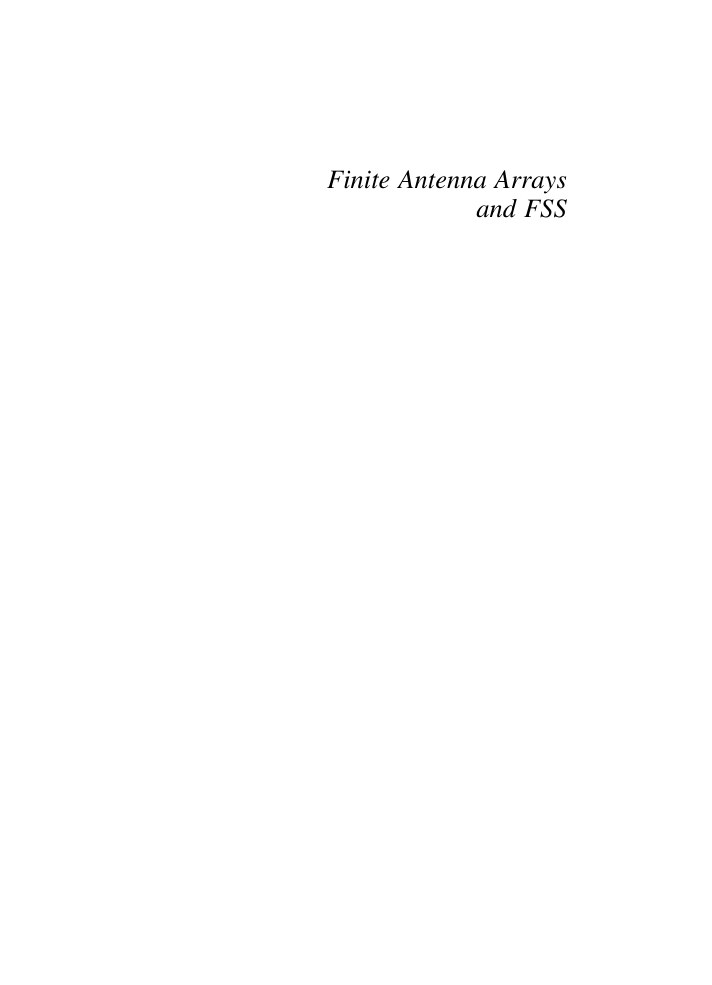
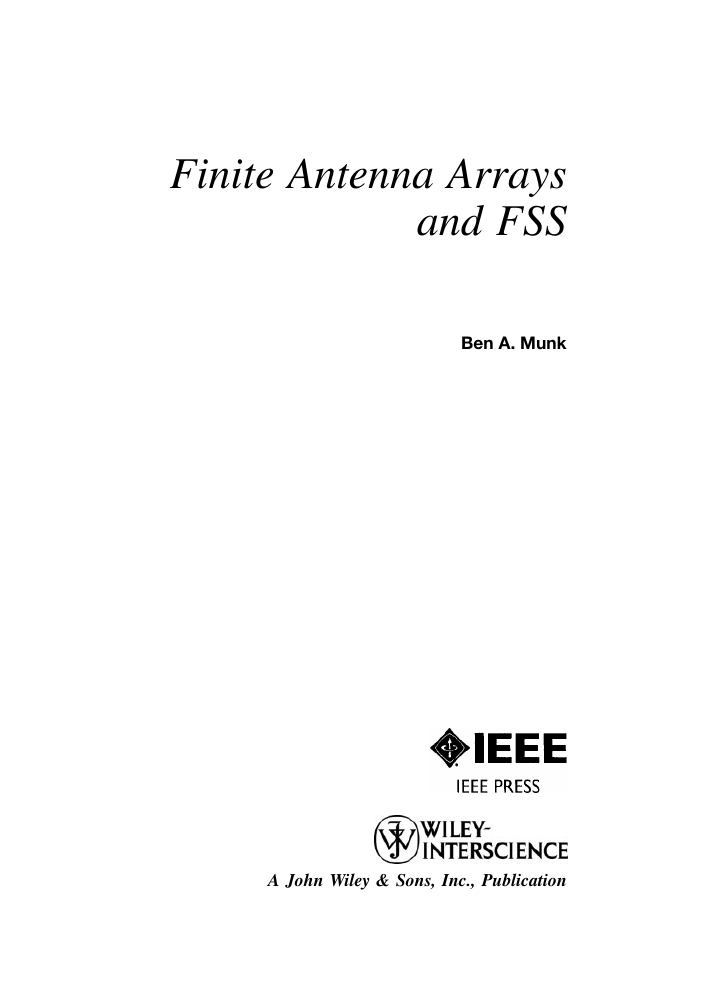
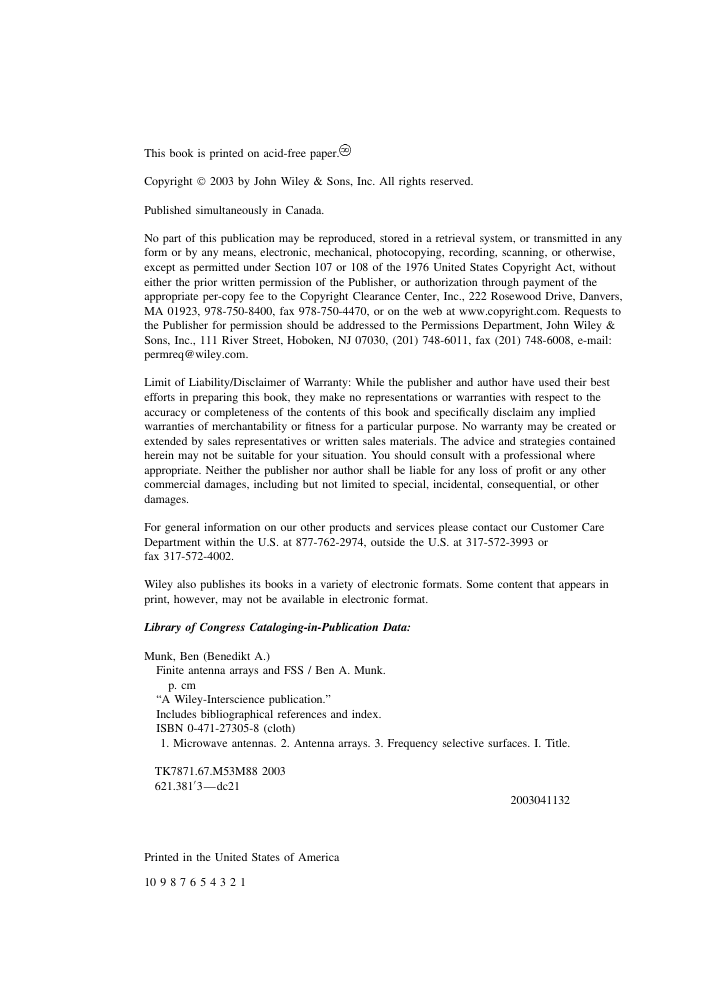
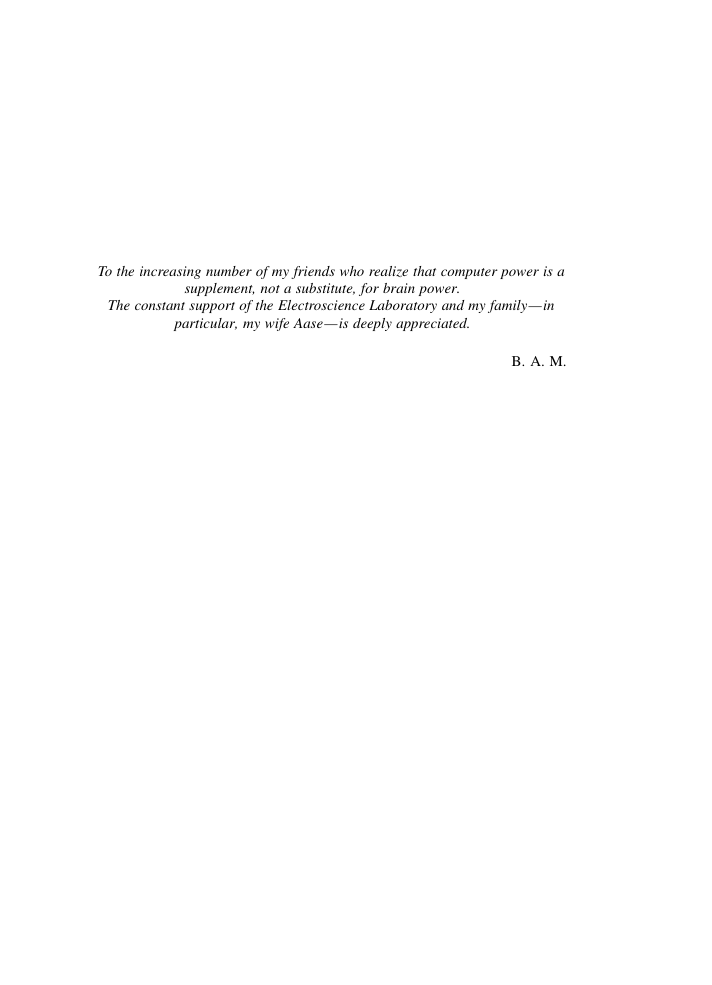
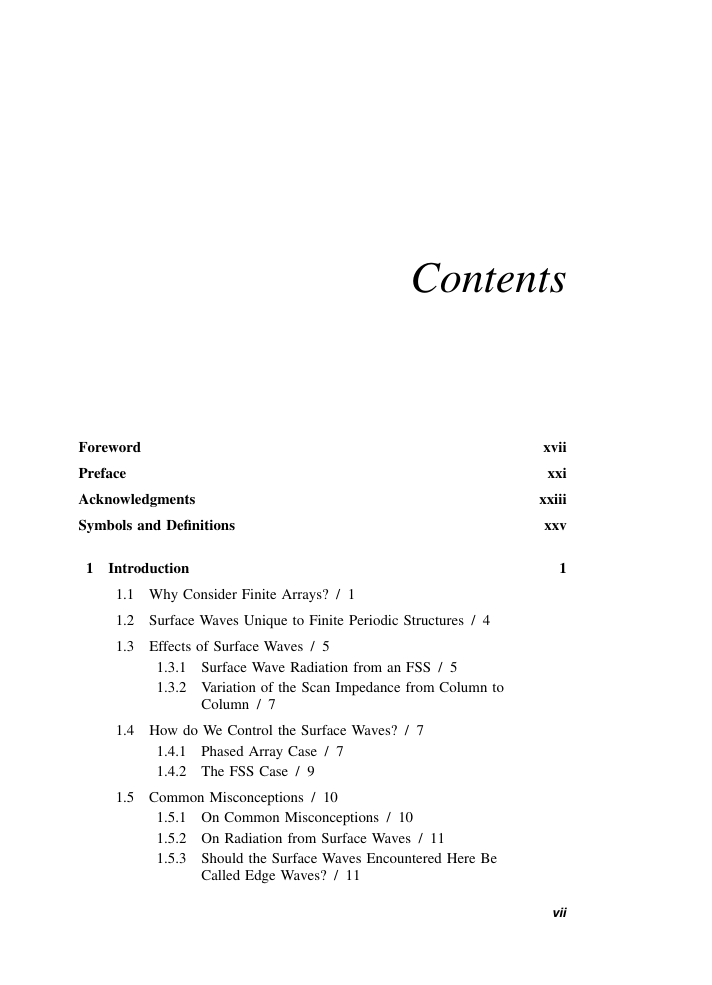
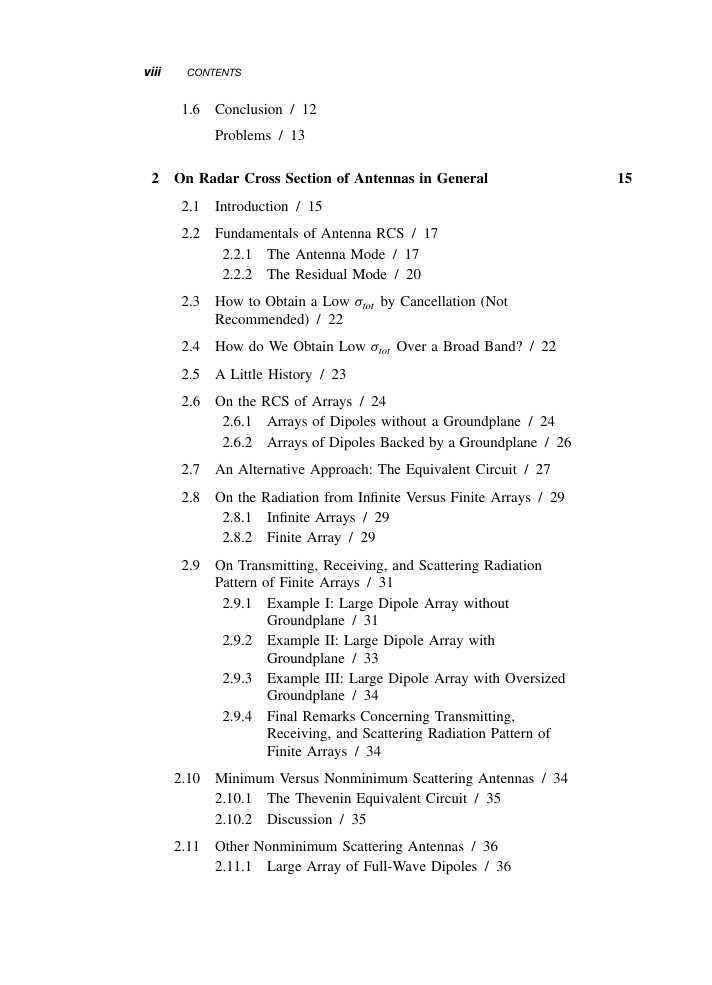
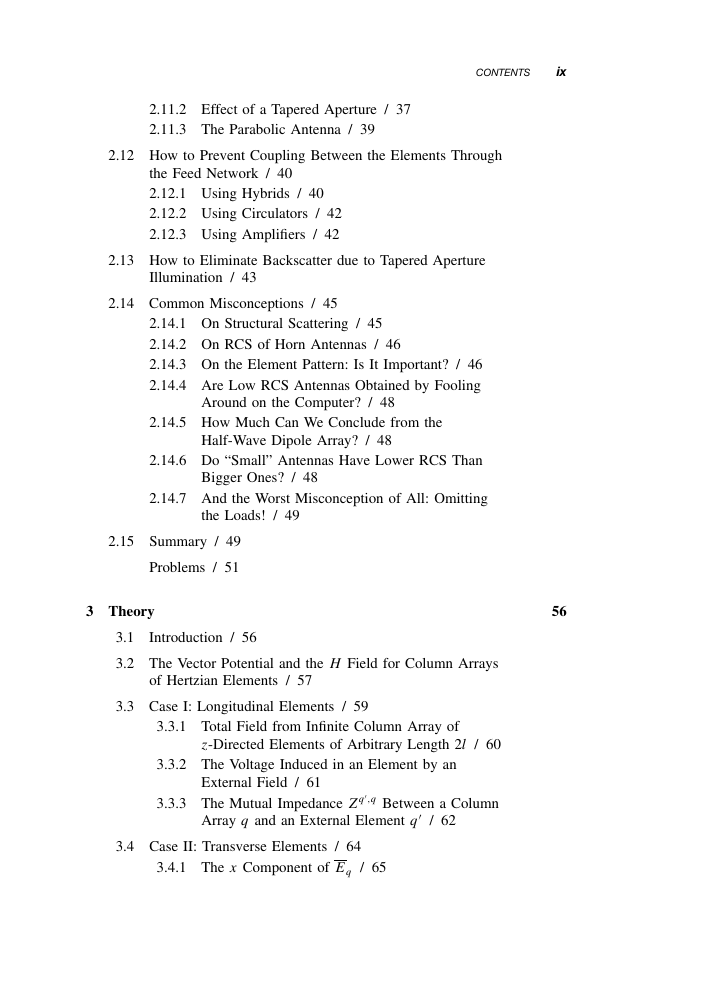
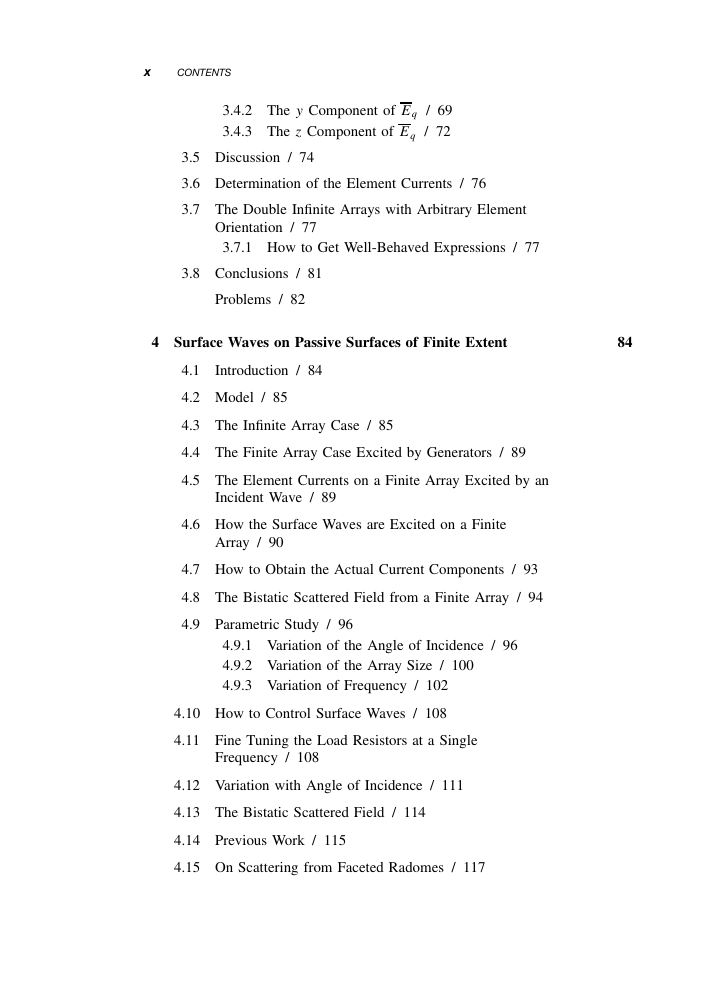








 2023年江西萍乡中考道德与法治真题及答案.doc
2023年江西萍乡中考道德与法治真题及答案.doc 2012年重庆南川中考生物真题及答案.doc
2012年重庆南川中考生物真题及答案.doc 2013年江西师范大学地理学综合及文艺理论基础考研真题.doc
2013年江西师范大学地理学综合及文艺理论基础考研真题.doc 2020年四川甘孜小升初语文真题及答案I卷.doc
2020年四川甘孜小升初语文真题及答案I卷.doc 2020年注册岩土工程师专业基础考试真题及答案.doc
2020年注册岩土工程师专业基础考试真题及答案.doc 2023-2024学年福建省厦门市九年级上学期数学月考试题及答案.doc
2023-2024学年福建省厦门市九年级上学期数学月考试题及答案.doc 2021-2022学年辽宁省沈阳市大东区九年级上学期语文期末试题及答案.doc
2021-2022学年辽宁省沈阳市大东区九年级上学期语文期末试题及答案.doc 2022-2023学年北京东城区初三第一学期物理期末试卷及答案.doc
2022-2023学年北京东城区初三第一学期物理期末试卷及答案.doc 2018上半年江西教师资格初中地理学科知识与教学能力真题及答案.doc
2018上半年江西教师资格初中地理学科知识与教学能力真题及答案.doc 2012年河北国家公务员申论考试真题及答案-省级.doc
2012年河北国家公务员申论考试真题及答案-省级.doc 2020-2021学年江苏省扬州市江都区邵樊片九年级上学期数学第一次质量检测试题及答案.doc
2020-2021学年江苏省扬州市江都区邵樊片九年级上学期数学第一次质量检测试题及答案.doc 2022下半年黑龙江教师资格证中学综合素质真题及答案.doc
2022下半年黑龙江教师资格证中学综合素质真题及答案.doc